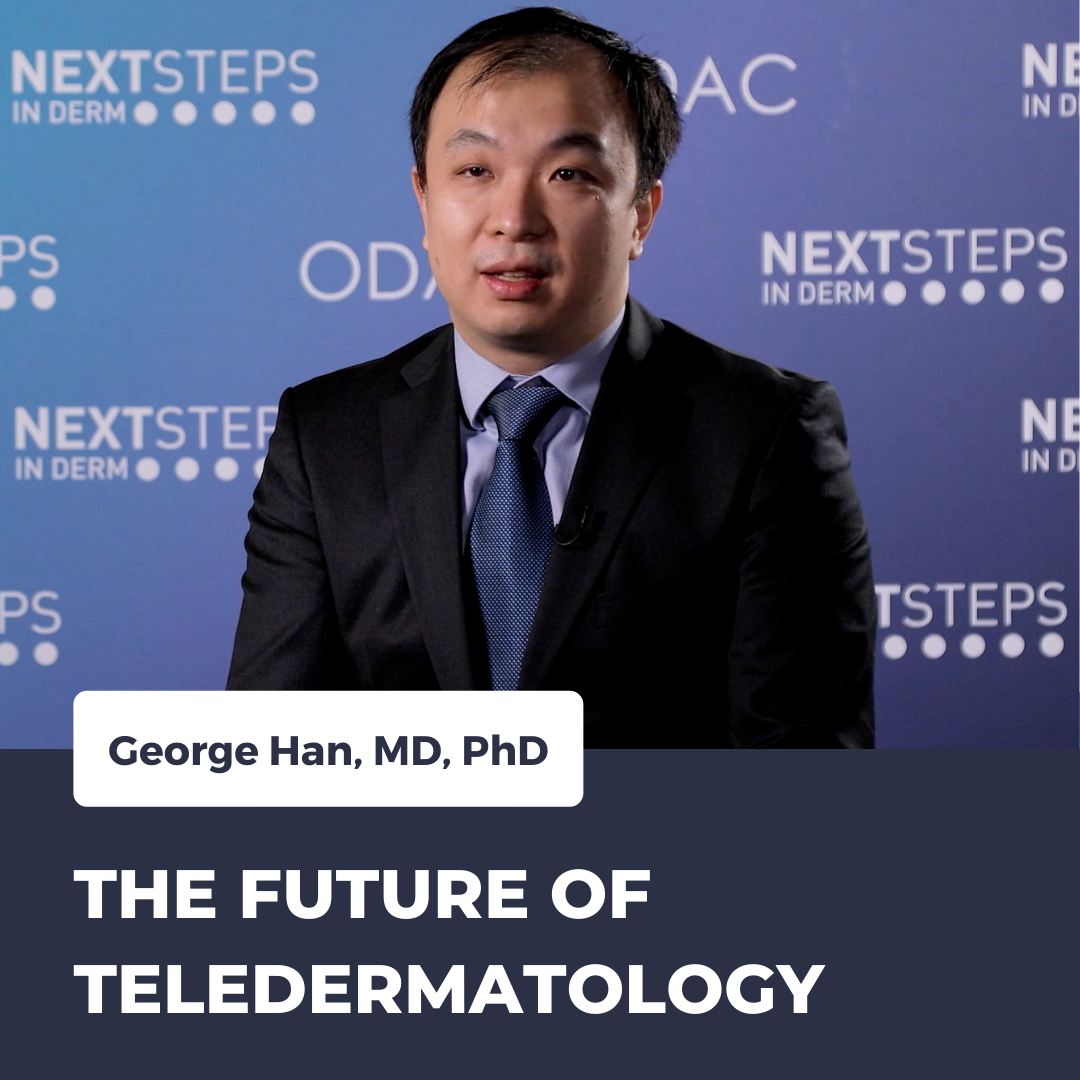Next Steps in Derm, in partnership with ODAC Dermatology, Aesthetic and Surgical Conference, interviewed Dr. George Han (Vice President of the Dermatologic Society of Greater New York, member of the board of directors of the New York State Society of Dermatology and Dermatologic Surgery, and member of the Medical Board of the National Psoriasis Foundation) about teledermatology’s rise during the COVID pandemic. Watch him reveal why dermatology is lagging compared to other specialities within telemedicine and how technology will help it catch up.
Further Reading
If you would like to read more about telemedicine and teledermatology, check out the following 2 articles recently published in the Journal of Drugs in Dermatology.
![]() Assessing Dermatology Provider Perceptions and Attitudes About the Unique Needs of Older Adult Patients
Assessing Dermatology Provider Perceptions and Attitudes About the Unique Needs of Older Adult Patients
Geriatric dermatology is an emerging field of dermatology, focused on the unique needs of older adults with dermatological diagnoses. Previous research identified important principles to consider in older adults with skin disease, including cognition, polypharmacy, mobility, social support and sleep disturbance.
INTRODUCTION
Geriatric dermatology is an emerging field of dermatology, focused on the unique needs of older adults with dermatological diagnoses. Previous research identified important principles to consider in older adults with skin disease, including cognition, polypharmacy, mobility, social support1 and sleep disturbance.2 As the population of older adults continues to rise, it is critical to identify the barriers to care and treatment faced by older adults patients to guide future interventions. We aimed to assess provider perceptions and attitudes regarding the unique needs of older adult patients in dermatology clinics.
Members of the Orlando Dermatology Aesthetic and Clinical Conference mailing list were surveyed via email. This study was approved by the George Washington University Institutional Review Board (IRB#: NCR213563). Of the 2840 recipients who opened the email invitation, 169 (5.9%) providers completed the survey. Of the survey respondents, 92.9% were dermatologists, and 6.5% were advanced practice providers (Table 1). Providers selected limited social support systems, difficulty in comprehension of treatment plans, and financial barriers as the three most pressing issues affecting the care of older adult patients. Hearing problems and lack of a social support system were the most commonly identified barriers to care, selected by 82.9% and 82.8% of practitioners, respectively. The following barriers to care in older adult patients were also identified by providers (%): immobility (74.4%), the ability of the patient to communicate clearly (69.5%), transportation barrier (77.5%), financial barrier (72.2%), Medicare limitations (66.9%), poor psychosocial functioning (77.5%) and telehealth due to the COVID-19 pandemic (71.2%) (Figure 1). Read the full article here.
![]() Disparities in Telemedicine Satisfaction Among Older and Non-White Dermatology Patients: A Cross-Sectional Study
Disparities in Telemedicine Satisfaction Among Older and Non-White Dermatology Patients: A Cross-Sectional Study
Telemedicine use has expanded rapidly during the COVID-19 pandemic. There is limited data on patient satisfaction with teledermatology; therefore, we examined patient teledermatology experiences at a large academic center.
INTRODUCTION
Telemedicine use has expanded rapidly during the COVID-19 pandemic. There is limited data on patient satisfaction with teledermatology; therefore, we examined patient teledermatology experiences at a large academic center.
After Weill Cornell Medicine Institutional Review Board approval, patients scheduled for teledermatology visits (1/2021–4/2021) were enrolled and sent pre/post-consultation questionnaires about telemedicine satisfaction, expectations, and concerns (5-point Likert scale) (82% response rate). Continuous outcomes were reported as means and categorical outcomes as percentages. Fisher’s exact and Chi-squared tests compared responses based on gender, age group, race, and clinic distance, respectively. Identical pre/post-consultation questions were compared with Wilcoxon signed-rank test (P<0.5). Read the full article here.
About Dr. George Han
 George Han, MD, PhD, is an Associate Professor in the Department of Dermatology at the Donald and Barbara Zucker School of Medicine at Hofstra / Northwell, where he leads efforts in clinical research and teledermatology. Dr. Han is a nationally recognized lecturer and researcher in numerous areas including atopic dermatitis, psoriasis, and teledermatology. To date, he has over 50 publications in well-respected journals such as the Journal of the American Academy of Dermatology, the Journal of Investigative Dermatology, the British Journal of Dermatology, the Journal of Infectious Diseases, and the American Journal of Pathology, as well as numerous book chapters and patents. He remains active in both basic science research and clinical trials, serving as Principal Investigator in numerous trials encompassing clinical areas such as Psoriasis, Atopic Dermatitis, Hidradenitis Suppurativa, and Vitiligo.
George Han, MD, PhD, is an Associate Professor in the Department of Dermatology at the Donald and Barbara Zucker School of Medicine at Hofstra / Northwell, where he leads efforts in clinical research and teledermatology. Dr. Han is a nationally recognized lecturer and researcher in numerous areas including atopic dermatitis, psoriasis, and teledermatology. To date, he has over 50 publications in well-respected journals such as the Journal of the American Academy of Dermatology, the Journal of Investigative Dermatology, the British Journal of Dermatology, the Journal of Infectious Diseases, and the American Journal of Pathology, as well as numerous book chapters and patents. He remains active in both basic science research and clinical trials, serving as Principal Investigator in numerous trials encompassing clinical areas such as Psoriasis, Atopic Dermatitis, Hidradenitis Suppurativa, and Vitiligo.
Did you enjoy these video pearls? Find more here.

